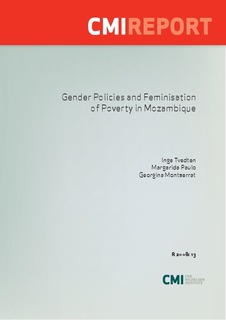| dc.description.abstract | This study is the first in a series of three on gender policies and feminisation of poverty in Mozambique, to be carried out in the period 2008-2010. The studies combine a critical assessment of current government and donor policies, with an assessment of the thesis of a feminisation of poverty in the country. Our main argument in this report is that the recent ‘streamlining’ or ‘essentialisation’ of gender policies, largely pushed by international agendas, implies the risk of designing policies that do not relate to national economic and socio-cultural realities. Gender relations are essentially socially constituted, and will be perceived differently and have different expressions in different socio-cultural settings. Moreover, while differences in material conditions of income and assets between men and women is an important part of the ongoing feminisation of poverty in Mozambique, it also involves questions around voicelessness and powerlessness in relation to institutions of society and the state, vulnerability to adverse shocks, and the ability to cope with these through social relationships and legal institutions. | |
